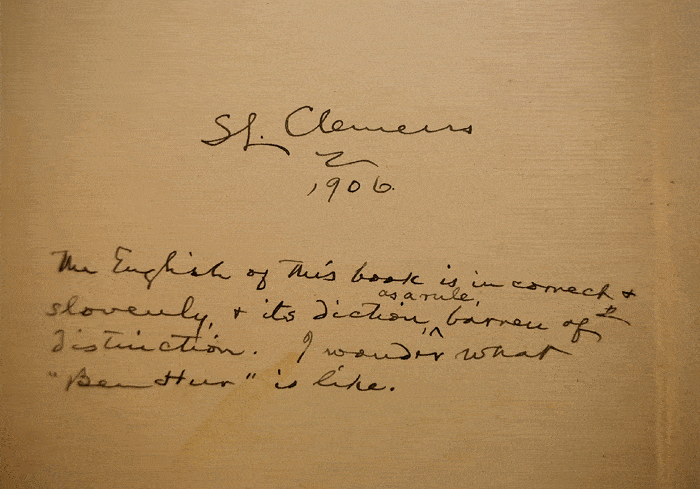According to a recent article in the New York Times, celebrated author Mark Twain was “often savage in his commentary” on other literary works. Voracious readers of the 19th and early 20th centuries commonly wrote in the margins of their books. Twain annotated already-published volumes by renowned authors Rudyard Kipling, Robert Louis Stevenson, and our own Lew Wallace.
So what did he think of Wallace’s writing style? In the picture below, you can see Twain’s thoughts written on the end page of his copy of Wallace’s 1906 Autobiography.

The transcription spells out his opinion clearly: “The English of this book is incorrect & slovenly & its diction, as a rule, barren of distinction. I wonder what ‘Ben-Hur’ is like.”
This may be professional jealousy on Twain’s part. After all, Wallace’s epic—which Twain had apparently not read—outsold Twain’s work handily.
On the other hand, he’s kind of right. I mean, a two-volume autobiography? Lew’s writing certainly comes across as incredibly long-winded. Modern readers, in particular, can get lost in the flowery, descriptive sentences that fill Lew’s writings.
But if it was “slovenly”, as Twain puts it, then why was Ben-Hur so popular? Was Mark Twain’s grammatical knowledge that far above the masses, or was he nitpicking other authors of popular works?
Frankly, even as the self-proclaimed “grammar police,” I find Twain’s comments unnecessarily abrasive. True, some of his better-known works—The Adventures of Huckleberry Finn, for instance—contain diction that is quite distinctive. And certainly, school school districts have banned Twain’s books from required reading lists, perhaps because of that diction.
But is his work “correct” enough to qualify him to criticize so harshly? Wallace was not the only recipient of his reproach. Perhaps the question for the ages is not so much, “did Lew Wallace’s writings measure up?” as, “can Mark Twain make these claims?”
One thought on “Mark Twain Said What?”
Those who will not criticizes there own works, find it easier to find faults in others; and there, then; you will find what they think of themselves…